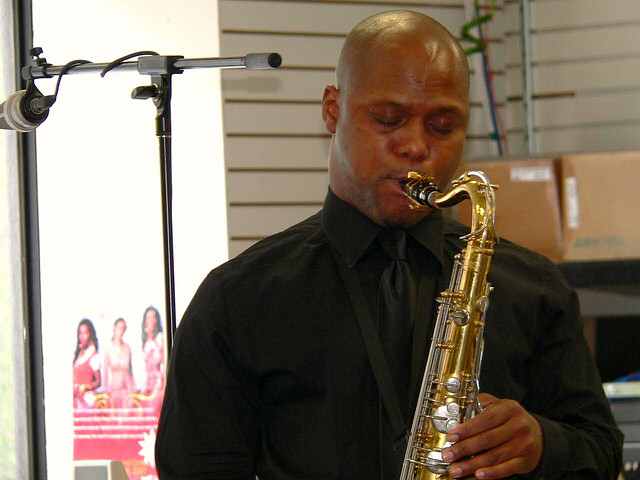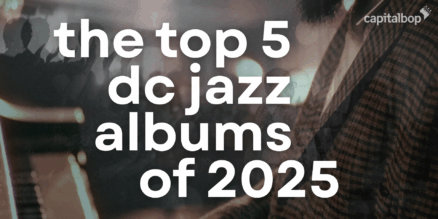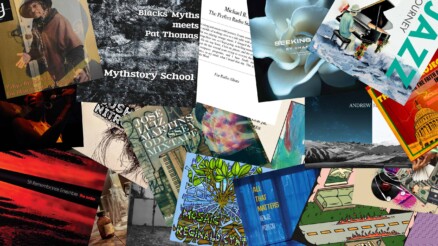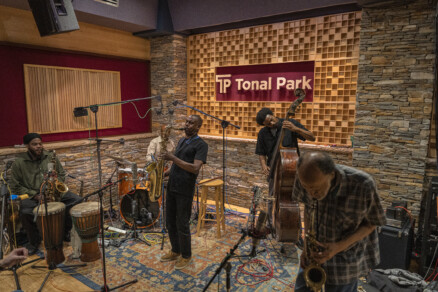Interview | J.D. Allen mines for inspiration in ‘the greatest democracy in the world’


District of Columbia, prepare for a brooding, deep-breathing and completely unpredictable musical experience this weekend. Tonight and tomorrow, a man who is redefining the tenor saxophone trio with a free-flowing, perpetually undulating sound that’s equal parts urban grit and celestial subtlety comes to Bohemian Caverns. That man is J.D. Allen. A finalist for the 2008, 2009 and 2010 Downbeat Critics’ Poll award for rising star on the tenor saxophone (correction inserted), Allen is joined by his regular trio, including bassist Gregg August and drummer Rudy Royston. This weekend’s gigs will be caught on film for a short documentary, to be included with Allen’s forthcoming CD, Victory!
With plenty of nods to John Coltrane‘s Eastern influences, spiritual inclinations and modal meditations, Allen also goes his own way. Coltrane had a way of blustering over the beat, like a fresh gust of wind confronting and reconstituting all the structures lying in its path. But Allen’s trio often has little interest in sticking to rhythmic structures itself, and the saxophonist is sometimes more in-the-pocket than his freewheeling rhythm section. Other times, he too wanders far out. Allen, who calls his music “urban” and “urgent,” says the bass and drums should be just as important as his saxophone: He considers this a very contemporary concept, in line with both progressive jazz ideals and pop music trends.
On Wednesday, the New York-via-Detroit musician spoke with CapitalBop about his origins, his manifold inspirations (both musical and otherwise) and how much he likes Bohemian Caverns. He also tipped us off to some very exciting news about the next project he’ll be leading, a departure from the trio format that was inspired by the Chilean miners who were rescued this week. A transcript of the interview is below.
CapitalBop: Looking ahead to your gigs at Bohemian Caverns this weekend, in terms of your live shows you’re becoming pretty well-known for your fluid and flowing style with your trio. You don’t really stop or take a break for formalities, you just let it flow.
J.D. Allen: When I’m performing I like to think of myself [as] choosing the tunes pretty much as a DJ would. You know, imagine yourself being at a party and the DJ stopped and announced every single tune. I’ve never been to a party like that. A DJ just kind of plays the tunes, and he sets the mood for the people to have a good time…. Another thing is, I don’t make set lists, so I really don’t know what I’m going to play next until I get to that moment. So there isn’t enough time to say, “Okay, now we’re going to play this, guys,” and count it off. [I] just jump in, and fortunately enough, the members of my band know the material pretty well where we can change pretty much on the fly.
And another thing, I’m really kind of shy to speak on the mic. You know, I don’t think there’s anything I can say on the microphone better than I can play it. So I just play it, and hope that the people are getting it. That’s pretty much it – no commercials, you know? I like to watch a movie in full effect, minus commercials…. And there’s a lot of space between tunes when you’re trying to count it off and develop a relationship with the audience verbally. That’s a lot of space, and I’m impatient in terms of that. I just want to get right to the music and keep the level high.
CB: What was your childhood like? What or who were some of your major inspirations, in terms of your own life?
JDA: I grew up in Detroit, Mich., and you know, it’s known for Motown and car factories, and I really didn’t want to pursue that line of work. It was tough, man, to be honest with you. Growing up, it was pretty tough. And I think the music –fortunately enough I realized that that was a mode of expression for me to get some things out, and I took advantage of that. I had enough sense to say, “This is what I like to do, and this is keeping me out of trouble.” You know, I had a childhood that was just tough. Very tough. I could have gone in a lot of directions, but I was blessed to be around people who inspired me to go in the direction of music, and I haven’t looked back since….
I went to a very great fine arts school in Detroit called Northwestern High School, and I got into it, man. It was either that, or the car plant, or the penitentiary. And I didn’t like the other two choices, so I chose the music. Or it chose me.
CB: You’ve said that yours is the music of the streets. What, specifically, about urban life do you hope comes through in your music?
JDA: The sense of urgency.
CB: Is there a song that might be a good example of that urban sense, that real grit, that urgency?
JDA: I think my last CD has a lot of that on it, for sure. The first song on it was “Esre!” and I think we captured what we’re talking about now with the sense of urgency. That was a street song, for me, and every time we play it I try to come from that aspect — just urgency and a do-or-die situation.
CB: Are there particular memories that you draw on when you play? Is there any part of your life that you can recall that really has an impact on your playing?
JDA: When I started off in church, when I was 13 — just the sincerity of playing [there], being very sincere and not bullshitting, being honest about my work. I try and keep that in mind.
Whatever the day brings, that’s what I bring to the stage. It can be a bad day and I play a bad day; it can be a great day and I play a great day. I try to keep it open, in terms of my feelings when I get on the stage. But it’s different day to day. A b-flat chord can be this thing one day, and the next day a b-flat chord can be another thing. And that’s the beauty of music: You can play the same note, but it can have a different meaning from day to day. So that’s where I’m coming from.
CB: Do you feel like the layout of your trio, sort of giving you a lot of free rein, allows for that mutability from day to day?
JDA: Yeah, I think the trio allows for a lot of those devices to be used. It enables me to change quickly. Yeah, it’s a great format; I think it’s a really “now” format. Not to say I don’t like the piano or anything like that. I was talking to a friend of mine a few months back, and I came to realize that that’s really a “now” thing in American music now — the bass and the drums are primarily the thing that people listen to. And I think the trio reflects a “now” situation. It’s a perfect format for me; I enjoy doing it and I feel new. It’s not new, because Sonny Rollins did it, Sam Rivers has done it. But I think it’s something that is becoming less of a novelty now. It’s a realization: More people are doing it, and it’s a great, intimate sound.
CB: You started mentioning some names, and I’m curious to hear what your major influences are, either as a saxophonist or just in general. Who do you really look up to?
JDA: Oh well, man, the list is pretty wide, but … Sonny Rollins is definitely a major influence. Branford Marsalis — big, big influence.
CB: What do you love about Branford’s playing?
JDA: Aw, well the thing is its rhythmic sensibilities; it’s the humor he has in his playing. And I learned a lot about trying to write short compositions. If you notice, his compositions a lot of times are very short, have a great hook to [them]. And personally, when I got a chance to hang out with him I realized that him and his music are pretty much one and the same. You know, he’s a brilliant musician and any situation that you hear Branford in, he sounds like Branford. He’s a very, very big influence.
You know, James Carter [is also an influence] — a lot of cats. I try to check out everybody.
CB: When we talk about jazz music, we really are talking about an African-American music. Jazz history, that’s African-American history too. What does it mean to carry on that tradition, carry on that history?
JDA: Well, I’m very proud to be a jazz musician, and for me it’s probably the greatest democracy in the world. We draw upon a lot of things. You can’t only attribute it to just the African influence, but also the European harmony. It’s a combination of the European harmony and the African influence, and that’s basically Black America right there when you say those two things. That’s what I’m made of, and most Black Americans are.
But to me, being a jazz musician, I like to think of that as being a searcher and a seeker of sorts. To better yourself as a person and a musician, and just to share with people what you found out. We’re like doctors, of sorts…. People come through a show, and they want to feel something and be moved, and it’s our job to be moving. But in order to move the people, we have to investigate. When you’re a musician, and particularly a jazz musician, you have to do a lot of investigating of self and others. So I’m very happy to be a part of that tradition — I wouldn’t trade it for the world.
CB: You’ve described religion as a very important part of your life – a tool for success, your sense of motivation and purpose. Were you always heavily religious? You say you have memories of the church.
JDA: It came into play for me at the age of 13…. My very first job was in a church. I played saxophone with the church choir. But I think in the last five or six years it’s become very important to connect with that in a special way — as a source of strength, as a source of inspiration. So I hate to say the word religion, because when you say the word religion, that word starts wars and fighting. And that word leaves a lot of things up for debate. In my mind, there’s no debating about what I feel — what I know for me to be the truth. For me, in my case, it’s introduced a lot of people into my life and I saw that they were used by God to help me and assist me and get things together. So I owe that to God, so I will confess that Christ has been a major player for me.
CB: Following that vein very loosely, I’m going to assume that one piece of music was probably important to you: I want to know when you first heard A Love Supreme, and if you can remember your reaction to it.
JDA: Oh wow, when I first heard A Love Supreme I was 16 years old, and it was simply amazing — as it is today. The great thing about it to me was also [the] liner notes that John Coltrane wrote. Very inspirational, and made me want to investigate what he was talking about: You know, what was he so grateful about and thanking God so much about? And I’m really glad I did, because once I checked that out at that early age, I was able to go back to that memory of checking that out, and use that as a source of strength and to also thank God for what He’s done for me in my life. So A Love Supreme is a special record, it really is. I go back and listen to it as much as I can — not as much as I used to, but it’s up there. Right up there with What’s Going On, Marvin Gaye. There’s a few records like that….
Something very special about that recording [A Love Supreme,] I have to add, because recently I heard another take of that record with Archie Shepp, which was also very brilliant. And it’s great on its own — it stands on its own. But that particular day at that particular time, it seemed as if those gentlemen [the John Coltrane Quartet] were born to do that and inspire people the way they did with that particular recording of A Love Supreme. It’s very, very special. It’s only 36 minutes, and it says so much.
CB: You’ve talked about being inspired by things you read in the paper. Your song “The Cross and the Crescent Sickle,” for one, was inspired by an article you read and a photo you saw in the New York Times about Islam in Russia. What else in the non-musical realm inspires what you do?
JDA: Well, you know, on our next recording — I plan on releasing it in February — there’s a particular piece on there called Philipe Petit. I saw a documentary called “Man on Wire,” it’s about Philippe Petit. He was a tightrope walker, and in the ’70s he put a rope between the two World Trade towers, and he could walk it. And the whole documentary is about how he got everyone to help him do it, and finally he accomplished his feat. And the documentary is so inspirational — just his passion and his drive, and the belief that he had in himself that he could do it, and the way that he was able to convince other people to believe in themselves that they could help him do it. It inspired me to write a song about him. And he’s someone that’s an inspiration for me, a non-musical person but an artist nonetheless.
There’s quite a few of those things — some tunes are about friends, and the way they are. And “Louisada” … on our first trio record, I Am, I Am, it’s about a club that we used to play at that gave us an opportunity to try to get some things together musically. And I’m always continuously using friends and loved ones and great stories and stories of inspiration as a source of material. Because every time I play it, I can be sincere about what I’m playing because those tunes have meaning to me. Although they don’t have lyrics, they have a title and it has a meaning, and I try to convey that message within the song….
For instance, this thing in Chile, with the 33 miners…. I’ve been following that very closely, and I’m writing some new material based off of that and the beauty of that: those gentlemen being trapped in this mine for 68 days, and yet still they managed to keep their sanity and health. It’s very inspirational, you know? So yeah, non-musical sources are very inspirational for me…. I have a whole bag of them, I have a whole bunch of tunes I want to write about people and places and things that I’ve seen.
CB: How do you think jazz lends itself, as an art form, to interpreting or communicating with social and political struggles or ideas? As you said, it’s a democratic thing and it’s a spontaneous thing. Is it especially appropriate for responding to things from the outside world?
JDA: Yeah, I think it’s a tool — and it’s been used. Charlie Haden had his Liberation [Music] Orchestra thing, and Archie Shepp is known for a lot of political things he wanted to get across through the music. Max Roach. You know, jazz music is a great art form, and I say it like this: It’s like a glass of water. You could have a glass of water and you could put another element within the glass of water, and it could become that thing. But the basis is the glass of water. The beauty of this music is that anyone from anywhere in the world can use it and point it in the direction that they need to go or want to go.
And yeah, I’m all for people using it for things that they want to get across. Charles Mingus did it, a lot of people. Maybe it’s happening less now than it did before, and maybe we might get back to that, but I welcome all forms of art. Art is supposed to inspire people, inform people and do all sorts of things: make people happy, make them make love, do all that. Jazz is no different than any other art form, you know? That’s what it’s for.
CB: What one thing other than jazz right now has got you thinking?
JDA: Well, like I said before, I think this thing of the miners in Chile. I saw an article on that, and the title of the article was, “Thoughts of 33.” When I saw that, I was like, “That’s a song. That’s a tune. That’s a title of a painting, or of an album, or something.” I took that title and I wrote it down, and I’m going to use that project.
That particular project is going to have vocalists on it…. I’m going to have a pianist on that one. So I’m going to implement probably voices and a piano, added onto the trio. So I’ve actually started working on that material right now, as we speak. I look forward to having it out by the end of 2011 — if not, early 2012. I’m all into the miners, man. I’m really happy that they’re making it out, and I was really fascinated by the story and the courage that they had, it was just inspirational. That’s where I’m at now. That got my juices flowing, when I saw that.
CB: So that’s going to be a departure from what we’ve seen recently.
JDA: That definitely will be a departure. That’s going to have the two vocalists … along with the pianist and some other things on it. That will be the departure. If ever I decided to depart from the trio format, it’s going to be something like that. That’s what I’m working on. But we also have another recording coming out this February that is a trio recording, and it’s going to have a documentary on it, on the CD itself. So I’m just trying to stay busy, and I have a lot of ideas. And thank God that the record companies have failed and there’s no one to tell you that you can’t do it, so I’m doing it!
CB: I heard that at Bohemian Caverns there might be some filming going on for the documentary?
JDA: Yes … there’s a gentleman by the name of [Mario Lathen] (correction inserted), doing a documentary entitled Victory! which is the name of the recording. And he’s filming the show in D.C., and he’s working on it now. He’s going to release it now on the CD. It will be an individual track, along with the record….
Bohemian Caverns is one of my favorite places — it has a historical significance and it’s a great place to play. We really enjoyed playing there in February, and they were nice enough to have us back in there, so that’s where we’re going to do the filming also.
—
J.D. Allen will perform with his trio at Bohemian Caverns tonight and tomorrow (Oct. 15 and 16). Find pricing, times, and other details about the shows here and here. Read about Bohemian Caverns here. Buy tickets at BohemianCaverns.com.
Bohemian Caverns, Branford Marsalis, DC, Gregg August, interview, jazz, JD Allen, NYC, Sonny Rollins, tenor saxophone, Washington




